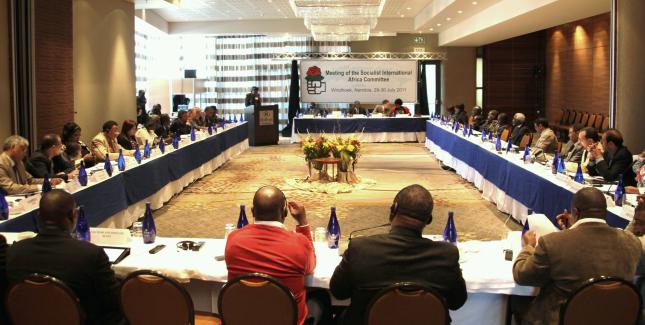SI Africa Committee
Meeting of the Committee in Windhoek, Namibia
29-30 July 2011

Latifa Perry
The Socialist International Africa Committee met in Windhoek, Namibia, on 29-30 July, bringing together representatives of political parties from Africa and beyond (List of Participants) to discuss an agenda which included ‘Good governance in Africa: the economic and political agenda’, ‘Electoral processes in Africa 2011-2012’, ‘Securing peace through conflict resolution’ as well as brief reports on the national situations in countries of the region.
The meeting opened with addresses by Pendukeni Iivula-Ithana, Secretary General of the host party, SWAPO, who warmly welcomed participants to Windhoek expressing satisfaction at hosting this SI meeting and rekindling the fraternal relations and solidarity with other parties of the region; by the Secretary General of the Socialist International, Luis Ayala, who underlined the crucial role of social democrats in Africa in leading the way for change, good governance, economic fairness and democracy, without which human development or the struggle against poverty and hunger cannot be won; and by the Chair of the Committee, Ousmane Tanor Dieng, leader of the Socialist Party of Senegal, who highlighted that good governance was impossible without the holding of free, fair and democratic elections, the rule of law and the fair distribution of national resources, and that democracy was the first step to ensure stability and lasting peace and security.
In the extensive discussions on the first main theme of ‘Good governance in Africa: the economic and political agenda’, participants concurred that the lack of good governance was intricately linked with a deficit of democracy and that it fundamentally required that the entire population was listened to and its aspirations taken into account in the political and economic efforts. Democracy and good governance were linked both in substance and in practice, and often sham democracies were hindering positive development. In order to move forward, to tackle poverty and to address the needs of the citizens, democracy needed to be linked with good governance which then would allow for economic and political stability.
On the second theme ‘Electoral processes in Africa 2011-2012’, several national situations were examined and taken as examples to underline that elections in some countries were still flawed, where the winner was known well in advance of the election, or represented a forced takeover validated by the judiciary or imposed by the military and where the Constitution and electoral laws were violated. With reference to the some 25 presidential and legislative elections to take place in the continent in the next eighteen months, the participants agreed unanimously on the need for voters to exercise their civic rights in free, fair, transparent and democratic elections, in order to prevent unrest among the population or the deterioration of the democratic credentials of the state. The Committee equally emphasised the importance that political actors respect these principles and that party members and supporters are educated accordingly.
‘Securing peace through conflict resolution’ was the third theme on the agenda, during which discussions focused on reasons for conflict ranging from civil wars tending to spread to neighbouring countries, ethnic and religious diversity leading to tensions, to the unequal share of natural resources causing high levels of poverty, famine, corruption and the collapse of political institutions. Social uprisings were the result of bad governance and unequal distribution of resources and often conflicts inside countries were caused by the lack of internal democracy. The resolution of these conflicts had to include a participative democracy where the population could express its will through the holding of regular, democratic and transparent elections. The protection and promotion of human rights, good governance and a sustainable economic and social development were all seen as important factors for peace, security and stability on the African continent. The Committee also reaffirmed the position adopted by the SI Council at its last meeting in Athens for a peaceful and lasting solution to the conflict of Western Sahara.
Touching upon the detrimental impact on African countries of drug trafficking, money laundering and terrorism, the participants agreed that these important issues should be addressed in greater depth at the next meeting of the Committee.
At the conclusion of the meeting, participants adopted the Windhoek Declaration, which highlights some of the key points in the discussions, and calls for Africa to be represented among the permanent members of the UN Security Council. In supporting the establishment of true democracies engaged in promoting human rights, prevention and resolution of conflicts, and the consolidation of peace, the Committee reaffirmed the important role of women in these areas.
Responding to a fraternal invitation from the PAICV of Cape Verde, the Committee agreed that its next meeting would take place in Praia later this year.
LINKS TO SOME OF THE COVERAGE OF THE MEETING:
Africans acknowledge ‘democracy deficits’, The Namibian1 August 2011
SI vows to enhance democracy, SWAPO website







